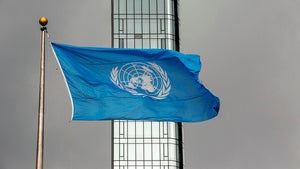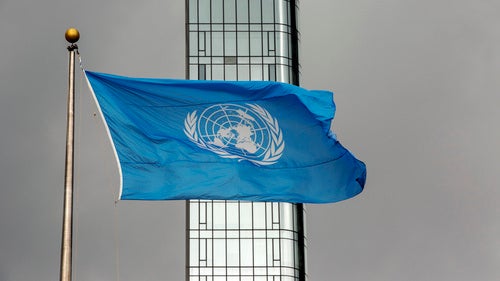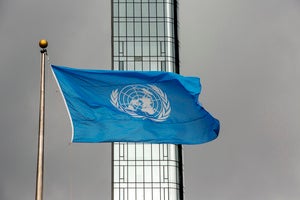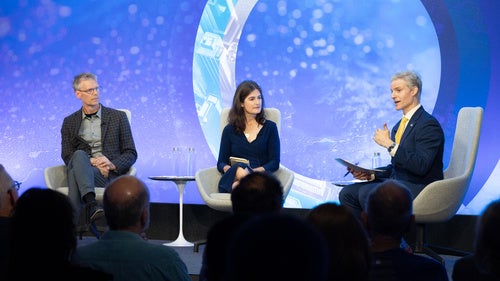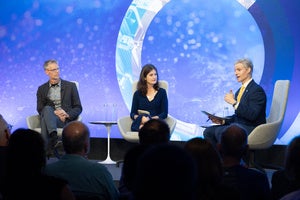The UN is Turning 80. Is It Still Relevant?
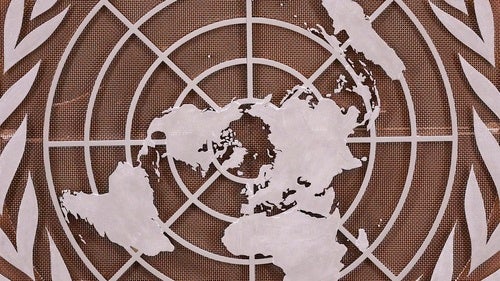
From peace and security to climate and technology, Council experts weigh in on whether the United Nations can still deliver on its founding mission.
As the United Nations marks its 80th anniversary, the question of the body’s relevance looms large. Undercut by financial shortfalls, US retrenchment, and growing geopolitical divides, can the UN remain a vital stage for global diplomacy or will competing powers shape a world order that sidelines it? Chicago Council on Global Affairs experts discuss what is at stake for the organization and its ability to act on humanitarian action, climate negotiations, and technological reform.
The Fundamental Challenge to the UN’s Legitimacy

Leslie Vinjamuri
President & Chief Executive Officer
It is easy to dismiss the United Nations. But those who are inclined to rush to judgment should pause to reflect on the fact that its more than 190 member states, with only a few exceptions, are sending representatives from across the world to New York City for the 80th session of the high-level week of the UN General Assembly. The vast majority are sending heads of state, presidents, or prime ministers. Mahmoud Abbas, the Palestinian president, has been denied a visa by US President Donald Trump, but will deliver his speech by video. If turning up is what matters, then the sheer popularity of the forum with world leaders is a clear indicator that the United Nations is widely viewed to be politically relevant and an important platform for shaping international discourse and influencing public opinion.
When measured by its ability to deliver impactful, material solutions to the most critical global problems, the United Nations’ relevance looks far worse. It has been radically diminished by the United States’ decision to delay critical budgetary support and put caps on its contributions to UN peacekeeping. This has threatened to create a spiral downward as other states, especially China, delay their own financial support for the beleaguered institution. The upshot is that the United Nations’ ability to tackle climate change, global health risks, humanitarian disasters, technological change, and longer-term development goals is shrinking, and it is shrinking rapidly. Rhetorical attacks by the United States are exacerbating the situation. Its decision to abandon, by withdrawing from the Paris Agreement on climate change and the World Health Organization has disrupted progress on two of the greatest challenges for the 21st century.
"The most fundamental challenge to the relevance of the United Nations is intimately linked to perceptions of its legitimacy. For many, this has been irretrievably compromised."
The most fundamental challenge to the relevance of the United Nations is intimately linked to perceptions of its legitimacy. For many, this has been irretrievably compromised. Of the five permanent members of the UN Security Council, those who bear a special responsibility, one—Russia—has blatantly violated the sovereignty of Ukraine. A second—China—has refused to condemn this violation and instead has made a display of its support for Russia. A third—the United States—is seen to have hit a high-water mark in its hypocrisy by providing seemingly unconditional support for Israel’s atrocities against Palestinian civilians in Gaza and failing to restrain Israel’s attacks on Qatar, a sovereign state and strategic partner of the United States. Great-power hypocrisy is not new, but for many at the United Nations it has reached new heights and eroded the institution’s relevance in its most central role, which is to ascribe or deny legitimacy to the use of force in international relations.
The Power of the UN’s Global Reputation

Craig Kafura
Director, Public Opinion and Foreign Policy
Under the second Trump administration, the United States is stepping back from the UN system it helped to create following the Second World War. In part, this is the normal partisan pendulum, with US engagement with the United Nations waxing and waning with successive Democratic and Republican administrations. The relationship reflects the deep and growing partisan polarization in the United States on the United Nations. As the 2025 Chicago Council Survey finds, Democrats (62%) are far more likely than Republicans (29%) to say that strengthening the United Nations is a very important goal for US foreign policy—the largest partisan divide on this question in the Council’s 50 years of polling.
Though the United Nations may not be a priority for Americans—and certainly not for the Trump administration—the United Nations’ image around the world remains favorable. Most publics in the 25-nation 2025 Pew Global Attitudes Survey hold net-positive views of the United Nations, and several nations—such as South Africa, Nigeria, and Germany—have seen favorable views of the United Nations rise over the past year. That perception makes the United Nations a still-useful venue for international contestation—and a tool for nations seeking international power and prestige.
"Though the United Nations may not be a priority for Americans—and certainly not for the Trump administration—the United Nations’ image around the world remains favorable."
With the United States stepping back from the United Nations, China is looking to step up. Indeed, Beijing’s influence within the United Nations has steadily grown in recent years as China has taken over leadership positions throughout the UN agency system. That reflects Beijing’s pursuit of greater international influence—and the Chinese public backs it. As the 2025 Chicago Council-Carter Center survey shows, two-thirds of Chinese citizens (68%) say that China’s participation in the United Nations has been very important for influencing global policies, and three in four (77%) agree that China should be more willing to make decisions on global problems within the UN framework—even if it means China will sometimes have to compromise on policies that aren’t its first choice.
If the United States steps back from the United Nations, others will step in. But when the pendulum swings back to greater engagement, Washington might find itself less capable of shaping an international system that has adjusted to its absence.
A Multipolar Balancing Act

Alexander Cooley
Nonresident Senior Fellow, Eurasia Affairs
The United Nations’ 80th anniversary arrives at a moment of paradox: its institutional architecture remains anchored in the post-1945 settlement, yet the order it was designed to govern is increasingly contested by Russia, China, and the Global South. Nowhere is this tension more visible than in the post-Soviet Central Asian states, where the Western-backed economic and political transitions of the 1990s and 2000s have yielded to competing influences, norms, and regional organizations supported by Moscow and Beijing.
Central Asian states’ recent UN votes on Ukraine highlight the challenges smaller powers face in this contested landscape. In 2014, they abstained or avoided the General Assembly resolution affirming Ukraine’s sovereignty over Crimea; eight years later, none supported the resolution condemning Moscow’s full-scale invasion, nor did they back Russia’s removal from the Human Rights Council.
These voting patterns exemplify the international “exit from hegemony”—the gradual erosion of the US-led liberal order. Central Asian governments do not want to isolate Russia, yet they uphold the UN principle of territorial integrity and engage with the United Nations on climate change, counter-narcotics, and conflict prevention. Their votes reflect careful calculations about geopolitical power dynamics and economic needs.
"Central Asian states’ recent UN votes on Ukraine highlight the challenges smaller powers face in this contested landscape."
Kazakhstan and Uzbekistan, the region’s largest states, are positioning themselves as anchors of regional cooperation not imposed by outside powers, while also courting Washington through the C5+1, over the last decade a regular fixture at UNGA. This year, held under the shadow of uncertainty about the Ukraine war and US tariffs, the talks will likely emphasize critical mineral investments and business ties.
Such behavior reflects the region’s “multivector” foreign policies. Sensitive to Russian and Chinese concerns, these states prefer to join multiple initiatives rather than lock themselves into a single order or isolate or shun a powerful regional neighbor. The Shanghai Cooperation Organization, Russia’s Eurasian Economic Union, China’s Belt and Road Initiative, and the C5+1 all provide different blends of visibility, resources, and geopolitical alternatives.
In 2025, the UN’s future lies in adapting to and facilitating the co-existence of these overlapping orders—a world where the Central Asian states can deepen regional ties, court Chinese and European Union investment and connectivity, maintain Russian security and migration links, and maintain cordial relations with the United States, all while avoiding choices that would force them to take sides.
An Important Test for the UN’s Role on Climate

Joshua Busby
Nonresident Senior Fellow, Public Opinion and Foreign Policy
This is a challenging moment for the relevance of UN processes to global climate governance. Successive secretaries-general of the United Nations have hosted climate gatherings to accompany the annual gatherings of the UN General Assembly. This year is no exception.
2025 is an important test for the United Nations’ role on climate for several reasons. As part of the 2015 Paris Agreement, countries are supposed to periodically update their so-called Nationally Determined Contributions (NDCs), their pledges of intent of action to address climate change. New pledges were due in February but only 36 states have announced new ones. By years end, more are expected, including from the world’s largest emitter, China.
Some countries may issue new NDCs in time for the UN General Assembly, but others will do so before the annual conference of parties (COP) that meets in the Amazonian city of Belém in Brazil in November. These annual gatherings of tens of thousands of delegates and observers have lost steam as an important driver of progress. The real action is one of country implementation and the transition to clean energy.
"With China supplying the globe with cheap renewables, batteries, and electric vehicles, the rest of the world has diminishing incentives to stick with technologies of the past."
With the United States announced withdrawal from the Paris Agreement, it is an open question whether other countries will abandon efforts to address climate change, despite accelerating climate impacts. The Trump administration is pressuring other countries to embrace fossil fuels and reject renewables. But, with China supplying the globe with cheap renewables, batteries, and electric vehicles, the rest of the world has diminishing incentives to stick with technologies of the past.
China itself has a way to go to reduce its dependence on coal. But, if UN processes can help keep pressure on China to break free of coal, the organization can claim some continued relevance going forward.
How the UN Will Achieve Multilateral Cooperation on Technology

Cécile Shea
Nonresident Senior Fellow, Global Security and Diplomacy
America’s recent retreat from the post-war, global economic order will not change one fundamental truth: technology advances that sprung from globalization are global in effect. Because of this, multilateral public-private partnerships can be better for producers, consumers, and potential exporters than unilateral or strictly private sector efforts. In some instances, international cooperation is vital to protect humanity.
Despite its importance, multilateral technology cooperation faces two significant hurdles. The first is national governments’ dramatically different views on privacy, censorship, misinformation, and the appropriate use of technology by law enforcement. The second challenge is how to include the technology powerhouse Taiwan in multilateral cooperation, given that China opposes Taiwan’s participation in any UN activities.
"America’s recent retreat from the post-war, global economic order will not change one fundamental truth: technology advances that sprung from globalization are global in effect."
Whether multilateral cooperation eventually occurs within the United Nations but without Taiwan, outside the United Nations with Taiwan but without China, or—most likely—in both places, the list of challenges and opportunities is long. The 10 items that follow are roughly in the order of easiest for the United States, China, and the rest of the world to agree to work on, to the hardest. Some of the first six items are prosaically non-sexy, though many are existentially important. Working on them might lay the groundwork for eventual cooperation on the last four items.
- Set international standards for self-driving vehicles, including the appropriate mix of lidar (radar), cameras, and rich maps to ensure safety and thus public acceptance; standardize systems for vehicles to communicate with each other and with infrastructure buoys; standardize systems to be used in parking lots and parking garages; adopt international standards for charging equipment and connections.
- Mandate that airports install technology to make taxiing, take-offs, and landings safer; develop standards for the future adoption of autonomous aircraft.
- Invest in developing new ways to recycle and reuse e-waste and set rules to prevent the world’s most vulnerable people from being saddled with wealthy users’ technology detritus.
- Encourage research in new energy storage systems, such as batteries, and new and less expensive renewable energy sources.
- Find more energy and water efficient ways to provide computer power for artificial intelligence (AI) technologies.
- Redouble international efforts to handle and safeguard nuclear waste.
- Set international “right to know” regulations so that humans will be told whether they are communicating with another human or with an artificial intelligence.
- Create international algorithm treaties so that individuals are told in detail how companies and governments employ algorithms and AI to make decisions.
- Establish an international law on digital and camera monitoring privacy.
- Establish a new international treaty on the appropriate and inappropriate uses of space.
In a Fractured World, the UN is Irreplaceable

Julián Ventura
Nonresident Distinguished Fellow, Latin America and the Global Economy
As the United Nations’ 80th birthday candles are lit and world leaders descend upon its Manhattan headquarters for a week of lofty speeches, its challenges appear more daunting than ever, from tackling intractable conflicts to replenishing fast-emptying budgets that enable life-saving humanitarian assistance to millions of people around the world.
In times of crisis, criticisms of the United Nations’ real and imagined shortcomings and inefficiencies tend to be magnified, ignoring the fact that it’s a consensus, state-driven body that relies on political will and sustained financing to fulfill its mandates.
"Salvaging the United Nations’ financially-starved humanitarian capabilities should be the most urgent task."
Amidst deepening global political divides and Washington’s sharp return to unilateralism, the outlook is grim for any possibility of ambitious collective actions and reforms. These obstacles notwithstanding, the United Nations is as relevant, and needed, as ever. Its universal character, institutional capacities, implementation muscle, and broad-based legitimacy as a venue for dialogue and diplomacy are irreplaceable in a fractured world.
Beyond their oft-repeated pledges of support for the United Nations and calls for international cooperation and solidarity, countries that are truly committed to preserving multilateral approaches need, more than ever, to expend political capital and act decisively to help the organization fulfill its core mandates, including by building issue-driven, cross-regional coalitions and securing additional funding, however limited in scope. Mexico and Norway, for example, are leading a “UN80 Initiative” which aims to bring together like-minded countries in support of practical reforms advocated by the secretary-general. By any measure, however, salvaging the United Nations’ financially-starved humanitarian capabilities should be the most urgent task.
The Most Important Work of the UN Remains in the Field

Karl Friedhoff
Marshall M. Bouton Fellow for Asia Studies
In central Seoul sits the Korean War Memorial, a quiet sanctuary in the middle of a now-thriving metropolis, dedicated to those who died in the conflict that devastated the Korean Peninsula in the early 1950s. Lining the breezeways that extend from the museum facade are bronze plaques, organized alphabetically by the 22 United Nations countries that sent troops, carrying the names of every solider that died fighting to defend the freedom of what is now South Korea. Seventy-five years since the outbreak of the Korean War, and 80 years since its founding, is the United Nations still capable of such a coordinated, international response?
"For all the attention it garners, the real work of the United Nations is not done in speeches at the dais or at meetings of the UN Security Council."
The short answer to that central question seems to be no. The organization has expanded, is riven by political, power, and economic allegiances, and its security resolutions are largely seen as unenforceable. Its reputation is being a place where more is said than is done, and we watch countries like the United States contort themselves to shield states that align with their interests, if not their espoused values.
But for all the attention it garners, the real work of the United Nations is not done in speeches at the dais or at meetings of the UN Security Council: The most important work of the institution remains in the field, although the nature of that work has shifted. It is the aid programs that deliver badly needed medicines and healthcare in the aftermath of natural or man-made disasters. It is in aiding refugees that have been displaced by wars and famine. It is in helping to ensure children are fed in the most challenging of operating environments.
The Original Purpose of the Security Council

Paul Poast
Nonresident Senior Fellow, Foreign Policy and Public Opinion
The United Nations is still relevant if one keeps in mind the core purpose of its founding: to prevent another world war between the great powers. In that sense, the United Nations is best not thought of as a “Parliament of Man,” to borrow the phrase that Harry Truman had borrowed from the famous British poet Alfred Tennyson, but as a “Concert of Great Powers.” Attempts to create such a body had been tried in the past, whether the Vienna system after the Napoleonic Wars or the League of Nations after World War I. That the United Nations has lasted longer than both of those failed attempts is, of itself, an accomplishment. But that the world has not witnessed another war on the scale of either the First or Second World Wars in the 80 years since the United Nations’ founding is a testament to its success.
"The original purpose of the Security Council was to prevent war between the great powers, not to prevent the great powers from waging war."
Of course, one could argue that the United Nations has not been responsible for keeping the peace between great powers. That credit should go to the horrible destructive power of nuclear weapons. But the two go together. The UN system has likely survived because of the presence of nuclear weapons. In a world in which states possess the means to end human existence, it is essential to maintain continual communication and diplomatic exchange between those wielding such weapons.
To be clear, the United Nations has not kept the peace in general. Indeed, today’s world is witnessing more conflict than at any point since the United Nations’ founding. But that is, again, to miss the point. The original purpose of the Security Council was to prevent war between the great powers, not to prevent the great powers from waging war.
A UN Without the United States

Suzanne Nossel
Lester Crown Nonresident Senior Fellow for US Foreign Policy and International Order
If the United Nations did not exist, you could never create it today. The globe's 193 nations would never be able to reach agreement on key questions of mission, structure, and priorities. That they did so 80 years ago was a function of the cataclysmic forces of the Second World War and the architectural moment that emerged out of a time of vast destruction. That said, the United Nations is in a clear crisis. The United States has retracted essential financial contributions, plunging the organization into financial freefall. The Security Council is deadlocked politically, and its composition, essentially frozen since 1945, has undercut its global legitimacy. International cooperation is on a downward slide as an age of austerity, self-interestedness, pitched global competition, and ascendent populism prevails.
"We may find ourselves in a mini-lateral world of issue-specific, politically-driven alliances of convenience, a 'world minus one' configuration."
While some ambitious reform proposals have been tabled, it is far from clear that the United Nations’ leading member states have the will to transform or attach sufficient priority to the institution to focus on how to keep it viable and vibrant. It is also not obvious what would replace the United Nations if it were forced to shrink and continue to lose stature. We may find ourselves in a mini-lateral world of issue-specific, politically-driven alliances of convenience, a “world minus one” configuration where the United States stands outside a measure of global consensus and momentum, or perhaps a UN system in which China takes up the reins and sets an agenda in keeping with Beijing’s goals and values.
The United Nations remains relevant as a source of lifesaving assistance for vulnerable people around the world, a standard setter in key areas, and a forum for global governance that is unique in its universality, the breadth of its remit, and the powerful, foundational treaties that underlie it, bringing together virtually all the nations of the world under a common set of goals and values. The Trump administration’s antipathy toward multilateralism is too entrenched to hope for an awakening to the virtues of global cooperation. In many ways, the United States made the United Nations. The question now is what the United Nations will make of itself without, or with very little of, the United States.
Related Content
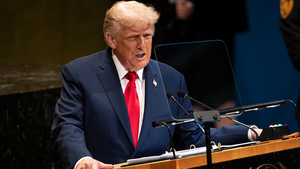
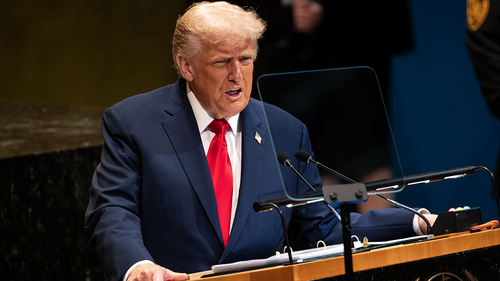
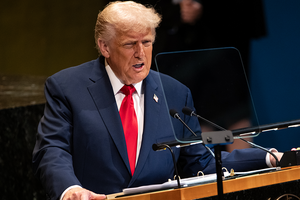 Global Politics
Global Politics
